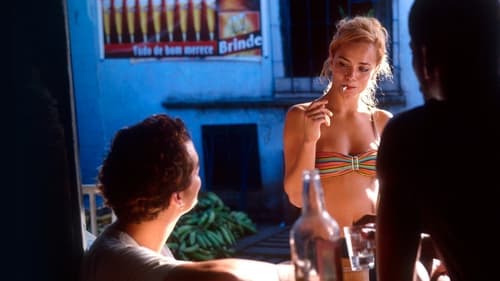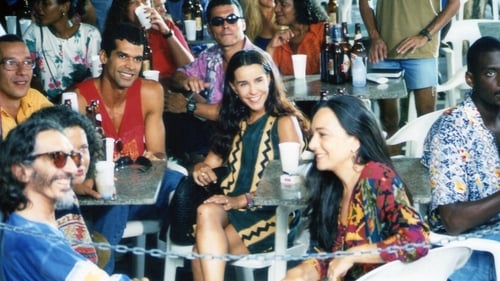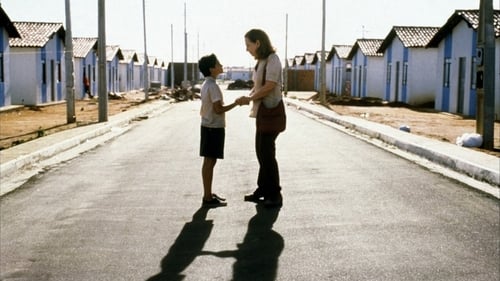Harildo Déda
Nacimiento : 1939-11-03, Simão Dias, Sergipe, Brazil

Diretor / Mestre Espiritual

Planta Carnívora
Tiny is a girl who takes care of her pet carnivorous plant with lots of love and fresh ants. On the eve of her 7th birthday, Tiny wants the plant to call him by her name, but the plant demands more and more ants. The ants, tired of being eaten, work out a plan that involves poetry, umbrellas and a time machine.

Lucio velho
Lúcio comes back home drunk and tired after a party late into the night and has a fight with his wife, Terezinha. Then, a butler shows up at their door to inform them Terezinha's mother has died.

Santo

Dubbings, stunts, remixes, aesthetic covers. Diffuse, decentralized, peripheral, tipsy. Theme: an extemporaneous choreographic chanchada. Content: artistic nudity, discrete zoophilia and dance.

Ex-padre americano
On a same night, five people from a small country town have the same nightmare. Upon the arrival of a pilgrim, the village is taken off its mediocre routine and the characters are thrown on the vortex of an uncommon situation. Each one’s truth will come to light, releasing them of the wicked hypocrisies, fears and diseases, compelling them to take control of their fate and rewrite their life.

Pai Martiniano

En un pueblo aislado y agobiado por las lluvias torrenciales, los habitantes viven no solamente en la miseria, sino también hostigados por la represión política. Existe una guerra por el poder entre la familia que detenta el control económico de la región y el interventor enviado por el Gobierno central. Por si esto no fuera suficiente, aparecen panfletos anónimos pegados en las puertas de las casas, revelando las intimidades de sus moradores. En medio de este caos, surgen todo tipo de pasiones, traiciones y venganzas, sin que los implicados sepan dónde empieza la verdad y dónde acaba la mentira. Basada en la novela de Gabriel García Márquez La mala hora, la película cuenta una historia de amor y odio en la que el pasado y el futuro se confunden. (FILMAFFINITY)

Careca
Deco y Naldinho se conocen desde que eran niños, incluso es difícil hablar del uno sin tener al otro en mente. Se ganan la vida como transportistas y aplicando pequeños golpes a bordo del Dany Boy, un barco a vapor que compraron juntos. Un día aparece Karinna, una chica que hace strip tease y que quiere conseguirse a un gringo adinerado en el carnaval de Salvador, donde el dúo la lleva. Después de descargar en Cachoeira, Deco y Naldinho van a una pelea de gallos. Naldinho apuesta el dinero que ha ganado con el transporte de la carga pero se mete en un lío y acaba siendo acuchillado. Deco lo defiende y ataca al agresor pero los dos amigos se ven obligados a huir en el barco rumbo a Salvador. Mientras Naldinho se recupera, Deco intenta conseguir dinero para ayudar a su amigo. Cuando llegan a Salvador se reencuentran con Karinna que ahora está trabajando en una discoteca. Poco a poco la atracción crece entre ellos y se les abre la posibilidad de llevar una vida de trío. (FILMAFFINITY)

Quelezinho

"3 historias" que consta de tres historias localizadas en Salvador, Bahía. "A fondo a" Ahora es Gris "," Diario de un Convento "y" El Padre del Rock ", el famoso carnaval.

Bené
En los asfixiantes pasillos de la Estación Central, en Río de Janeiro, una antigua maestra se gana la vida escribiendo las cartas que le dictan los analfabetos. Endurecida por la soledad y por la adversidad, Dora ha ido cayendo en una estoica indiferencia. Sin embargo, cuando una de sus clientes muere atropellada a la salida de la estación, decide hacerse cargo de su hijo y llevarlo a casa de su padre en una remota zona del nordeste de Brasil.

Coronel Artur
Just when her family starts believing that she is dead, and that they can expect a rich heritage, Tieta returns from São Paulo to her native village in Bahia, which she had been forced to leave long ago because of some involvement with a goat herd. Believed to be fabulously rich - and nobody knows how - she brings to the great disappointment of her family a young step-daughter and heir. With the arrival of Tieta turmoil enters into the life of her family and their fellow villagers. Most particularly into the life of her nephew - promised to the Church - and the young aspiring mayor.

Narrador

Padre

João da Silva Brown, a resident of Salvador, has always been a fan of comics, movies and adventure series and superheroes. Once he learns about a course for detectives and decides to attend it. With his private detective degree, he sets up an office and places an ad in the newspaper. Now wearing a cape and hat, he waits in vain for customers.

In the beginning of the 20th Century, in the Northeast of Brazil, one of the first Brazilian industrialists is persecuted because he refuses to sell his business to a British company.

Professor Fontes
When a prominent U.S. Nobel Laureate arrives in Salvador, Bahia, the city with the largest black population in Brazil, he stirs emotions by championing a long-forgotten local writer named Pedro Archanjo, who believed that humanity would be improved only through miscegenation.

Rocha

This Brazilian film is set during the period of its initial colonial discovery and settlement. The title refers to a word the native peoples used for the coastal lands: "pindorama," or "place of the small trees." A ponderous and grandiose film, it was roundly booed when it was aired at the 1971 Cannes Film Festival.












